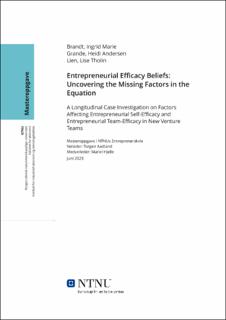| dc.contributor.advisor | Aadland, Torgeir | |
| dc.contributor.advisor | Hjelle, Mariel | |
| dc.contributor.author | Brandt, Ingrid Marie | |
| dc.contributor.author | Grande, Heidi Andersen | |
| dc.contributor.author | Lien, Lise Tholin | |
| dc.date.accessioned | 2023-10-05T17:21:33Z | |
| dc.date.available | 2023-10-05T17:21:33Z | |
| dc.date.issued | 2023 | |
| dc.identifier | no.ntnu:inspera:152978446:152981928 | |
| dc.identifier.uri | https://hdl.handle.net/11250/3094633 | |
| dc.description.abstract | Entreprenøriell mestringstro (Entrepreneurial Self-Efficacy) er anerkjent som en av de viktigste faktorene som påvirker og bestemmer entreprenøriell intensjon (Newman et al., 2019; Shinnar et al., 2014; Taneja & Bhatia, 2022). Til tross for dette har ikke akademikerne viet like mye oppmerksomhet til entreprenøriell mestringstro i team (Entrepreneurial Team-Efficacy).
I økende grad vektlegger entreprenørskapsfeltet teamarbeid høyere enn individuell innsats, noe som også gjenspeiles i forskning på teamprestasjoner (Black et al., 2019). I tillegg er mestringstro i NVT (New Venture Team) fortsatt lite forsket på (Klotz et al., 2014). Denne studien forsøker å adressere disse identifiserte gapene i forskningen ved å ta i bruk en longitudinell kvalitativ tilnærming, med fokus på individene og gruppene i NVT-er som tar del i et praktisk orientert entreprenøriell utdanningsprogram (Venture Creation Program). For å guide forskningen videre, har følgende forskningsspørsmål oppstått:
“Hvilke faktorer påvirker nye venture teams medlemmers entreprenørielle mestringstro og teamets mestringstro over tid?”
Gjennom to intervjurunder ble ti studenter intervjuet i to omganger, som resulterte i 20 intervjuer totalt. Dette har bidratt med dybdeforståelse i dynamikken av ESE og ETE innad i oppstartsteamene. Datainnsamlingen avdekket et behov for diskusjon rundt konseptene; oppgave forpliktelse, motivasjon, teamsamhold, entreprenørielt økosystem, VCP og entreprenørens indre liv for forståelse av hvordan sin mestringstro utvikler seg.
Funnene som er gjort, foreslår at endring i oppgaveforpliktelse og motivasjon påvirker svingninger i nivåene av ESE. I tillegg viser studien at utviklingen av individets mestringstro påvirker teamsamhold, som blir balansert av deres holdninger og følelser mot oppstartsbedriften. Det ble ikke funnet en direkte relasjon mellom teamsamhold og teamets mestringstro. Forfatterne argumenterer for at forbedringen i teamets mestringstro primært kommer fra andre faktorer enn teamutvikling og intern dynamikk. Forfatterne foreslår at omgivelsene innenfor VCP hvor teamene befinner seg, og oppfatningen av med-gründerne har en avgjørende rolle for å fremme både ETE og ESE. | |
| dc.description.abstract | Entrepreneurial self-efficacy (ESE) has been widely acknowledged as a significant factor in determining entrepreneurial intention (Newman et al., 2019; Shinnar et al., 2014; Taneja & Bhatia, 2022). However, the influence of entrepreneurial team-efficacy (ETE) has received less attention from scholars and practitioners. With the field of entrepreneurship increasingly emphasising team collaboration over individual efforts, research on team performance has shifted accordingly (Black et al., 2019). Moreover, efficacy beliefs in New Venture Teams (NVTs) remain scarce (Klotz et al., 2014). This study aims to address these gaps by adopting a longitudinal qualitative approach, considering individual and group levels in NVTs enrolled in a Norwegian Venture Creation Programme (VCP). To guide the research, the following research question is addressed:
What factors influence new venture teams' members' entrepreneurial self-efficacy and the teams' entrepreneurial team-efficacy over time?
Ten students were interviewed in two data acquisition rounds with two months in between, resulting in 20 interviews in total. This provides an understanding of the dynamics of ESE and ETE within new venture teams. The data acquisition revealed the need for discussion around concepts such as task commitment and motivation, team cohesion, entrepreneurial ecosystems, VCP, and the inner life of the entrepreneur in order to comprehend how the NVT's efficacy beliefs evolved.
The findings suggest that changes in task commitment and motivation drive fluctuations in levels of entrepreneurial self-efficacy. Additionally, the study reveals that the development of an individual's entrepreneurial self-efficacy influences team cohesion, mediated by their attitudes and feelings towards the venture. However, no direct relationship is found between team cohesion and entrepreneurial team-efficacy. Expanding on this concept, the authors argue that the enhancement in entrepreneurial team-efficacy primarily stems from factors beyond team development and internal dynamics within the studied new venture teams. Instead, they propose that the surrounding environment, particularly the venture creation program in which the teams actively participate, and the profound inner perceptions of the entrepreneurs involved, play crucial roles in fostering both entrepreneurial team-efficacy and entrepreneurial self-efficacy. | |
| dc.language | eng | |
| dc.publisher | NTNU | |
| dc.title | Entrepreneurial Efficacy Beliefs: Uncovering the Missing Factors in the Equation.
A Longitudinal Case Investigation on Factors Affecting Entrepreneurial Self-Efficacy and Entrepreneurial Team-Efficacy in New Venture Teams. | |
| dc.type | Master thesis | |
